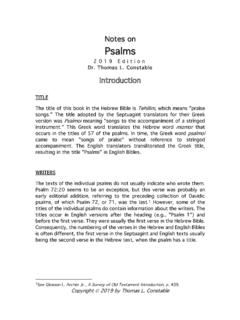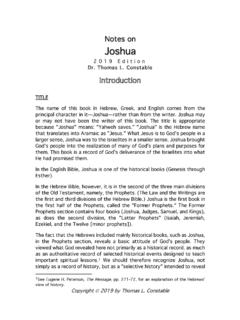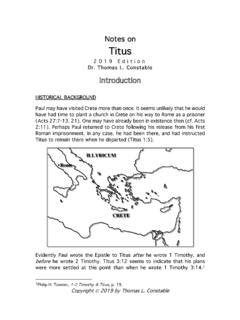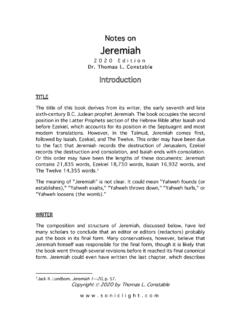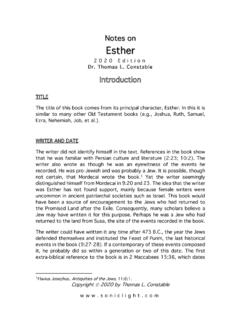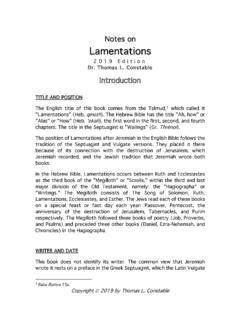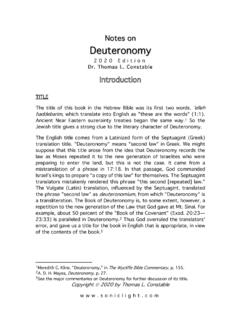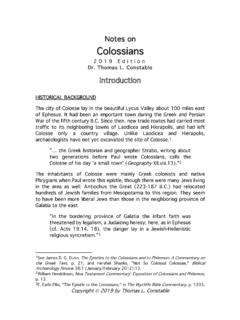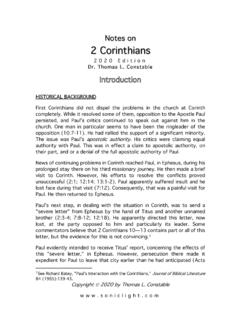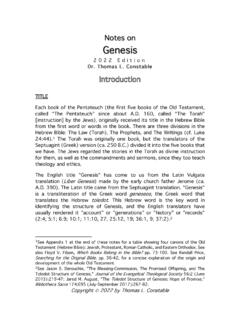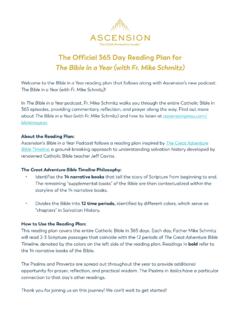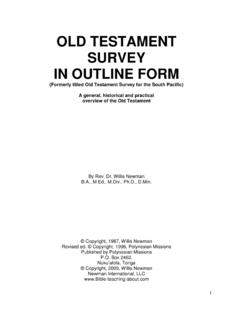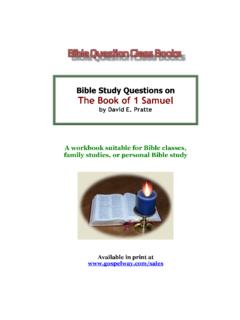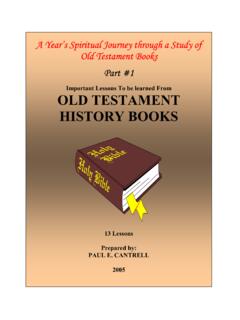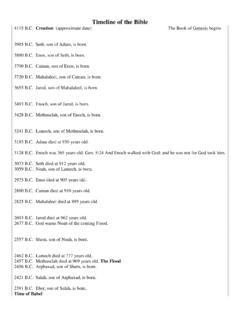Transcription of Notes on 1 Samuel - Plano Bible Chapel
1 Copyright 2022 by Thomas L. Constable Notes on 1 Samuel 2022 Edition Dr. Thomas L. Constable TITLE First and Second Samuel were originally one book called the Book of Samuel in the Hebrew Bible . The Greek Septuagint translation of the Old Testament (made ca. 250 ) was the first to divide it into two books. The Septuagint translators titled these books 1 and 2 Kingdoms. That division has persisted ever since and has even been incorporated into subsequent editions of the Hebrew Bible (since the Venetian printer Daniel Bomberg's first edition of the Hebrew Bible about 1516).1 The title " Samuel " was given by Jerome in his Latin translation, the Vulgate (ca. 400). The Jews gave the name " Samuel " to it because Samuel is the first major character in the book. Samuel anointed both Saul and David, so in this respect he was superior to both of them.
2 DATE AND WRITER The writer did not identify himself. Statements in the Book of Samuel (1 and 2 Samuel ) imply that someone who had witnessed at least some of the events recorded wrote it. However someone, or more than one person, must have written most of it after Samuel 's death ( , 1 Sam. 25 2 Sam. 24) and some of it even after the division of the kingdom following Solomon's death ( , 1 Sam. 27:6). These features have made it difficult to date the book. "Our guess is that the author was a high state official in frequent attendance at the court, enjoying the full confidence of David and his household, who served David throughout his reign in Jerusalem and also Solomon during the early years of 1 John J. Davis, in A History of Israel, p. 182. 2 Dr. Constable's Notes on 1 Samuel 2022 Edition his reign, and whose duties may have been connected with literary work.
3 "1 Most conservative scholars prefer the view that Samuel may have written or been responsible for noting the record of earlier events in the book (chs. 1 24). Then some unidentifiable writer or writers put it in its final form later, perhaps soon after Solomon's Critical scholars tend to believe it was the result of much more piecing together, and some of them date its final form as late as 500 The Babylonian Talmud (a Jewish commentary dating from about 500) attributed authorship of 1 Samuel 1 24 to the prophet Samuel , and the rest to Nathan and Gad (cf. 1 Chron. 29:29).4 It is unlikely that Samuel wrote both One conservative estimate of the final date of composition is about 960 Another guess is near 920 or 900 SCOPE The Book of Samuel covers the period of Israel's history bracketed by Samuel 's conception and the end of David's reign.
4 David turned the kingdom over to Solomon in 971 David reigned for 40 and one-half years (2 Sam. 2:11; 5:5). This means he came to power in 1011 Saul also reigned for 40 years (Acts 13:21) so he became king in 1051 We can estimate the date of Samuel 's birth fairly certainly, on the basis of chronological references in the text, to have been about 1121 Thus 1M. H. Segal, "The Composition of the Books of Samuel ," Jewish Quarterly Review 55 (1964-65):334. 2 See Brian N. Peterson, "The Authorship of Samuel : The Deuteronomist 70 Years after Noth," Bibliotheca Sacra 172:688 (October-December 2015):416-32, who suggested that Abiathar the priest did 3 For a refutation of this view, see Gleason L. Archer Jr., A Survey of Old Testament Introduction, pp. 284-85. 4 Baba Bathra 14b, 15a. 5 See David M.
5 Howard Jr., An Introduction to the Old Testament Historical Books, pp. 142-43. 6 Eugene H. Merrill, "1 Samuel ," in The Old Testament Explorer, p. 204. 7 Roland K. Harrison, Introduction to the Old Testament, p. 709. 8 See Edwin R. Thiele, The Mysterious Numbers of the Hebrew Kings, pp. 51-52. 9 See Eugene H. Merrill, kingdom of Priests, pp. 149-50. 2022 Edition Dr. Constable's Notes on 1 Samuel 3 the Book of Samuel spans the years 1121-971 , or about 150 years of history. The first part of 1 Samuel overlaps historically with the end of the Judges Period that we find recorded in the Book of Judges. Josephus wrote: "Now after the death of Samson, Eli the high-priest was governor of the Israelites."1 Apparently Samson was born just a few years before Samuel . Samson's 20-year judgeship evidently began shortly before the battle of Aphek (1104 ) at which time Eli died (1 Sam.)
6 4:18).2 It ended not many years before the battle of Mizpah (1084 ) when the Philistine domination of Israel ceased temporarily (1 Sam. 7:13). Samuel 's ministry, therefore, probably ran concurrent with that of Samson until Samson died. Saul began to reign about 35 years after Samson died ( , 1051 ). Samuel evidently lived about 30 years after OLD TESTAMENT HISTORY Events Biblical References Creation to Israel's move to Egypt Genesis 1 50 The Exodus Exodus 1 18 Israel at Mt. Sinai Exodus 19 Numbers 10 The Wilderness Wanderings Numbers 11 21 Israel on the Plains of Moab Numbers 22 Joshua 2 1 Flavius Josephus, Antiquities of the Jews, 5:9:1. Josephus' statements are not always in harmony with the biblical text and reflect a certain element of Jewish tradition that was common when he wrote, , in the first century 2 Leon J. Wood, Israel's United Monarchy, p.
7 23, wrote that the battle of Aphek happened about 1075 Though Wood is helpful in many respects, I do not think his dates are as accurate as those of Merrill and Thiele. 3 Merrill, kingdom of .., pp. 149-50. 4 Dr. Constable's Notes on 1 Samuel 2022 Edition The Conquest and Division of Canaan Joshua 3 24 The Amphictyony (rule by judges) Judges 1 1 Samuel 7 The Reign of Saul 1 Samuel 8 31; 1 Chronicles 10 The Reign of David 2 Samuel 1 24; 1 Chronicles 11 29 The Reign of Solomon 1 Kings 1 11; 2 Chronicles 1 9 The divided Monarchy 1 Kings 12 2 Kings 17; 2 Chronicles 10 31 The Surviving kingdom of Juda 2 Kings 18 25; 2 Chronicles 32-36 The Return under Zerubbabel Ezra 1 6 The Return under Ezra Ezra 7 10 The Return under Nehemiah Nehemiah 1 13 PURPOSE A main purpose of the Book of Samuel seems to have been to record the establishment of kingship in Israel and to explain its theological significance.
8 It deals with the Israelites' initial request for a king, the establishment of that king (Saul), and the tragic results of that king's reign. It then explains the consolidation of power under a second king (David), God's promises to him, and his decline in his later years. The climax of the book comes in 2 Samuel 7, where God promises David an everlasting dynasty. The writer (or writers) clearly wanted to legitimatize the Davidic monarchy and dynasty. Whether and how the monarchy should be established are main subjects of 1 Samuel , and the question of who should be Israel's king dominates much of 2 As with all the historical narratives of the Old Testament, the Holy Spirit's purpose in giving us the books of 1 and 2 Samuel was not just to record events that transpired. It was primarily to teach spiritual lessons to the 1 Howard, pp. 141, 146-47.
9 2022 Edition Dr. Constable's Notes on 1 Samuel 5 original readers, and to readers of all time, by revealing the causes and effects of various human responses to God's God guided the inspired writers of Scripture to teach theology as well as to record history. This is clear in all the so-called historical books of both Testaments. We can see this as we examine the reasons God selected the particular events and facts that He recorded, through the biblical writers, for inclusion out of the mass of possible data that He could have set forth. Scholars have disputed what it was that the writer chose to emphasize primarily in the Books of Samuel . Some have felt his unifying purpose was to demonstrate the sovereignty of Some believe it was to show that God provides leadership for His Others have seen the purpose as something else.
10 I believe those who see the record of what happens to individuals and nations, when they trust and obey God's Word or fail to do so, have identified the primary For the Israelites, their commitment to obey the Mosaic Covenant out of trust in God, and gratitude for His calling them to receive His grace, would result in God blessing them (Deut. 28:1-14). However if they despised His grace and departed from His will, as expressed for them in the Mosaic Covenant, He would curse them (Deut. 28:15-68). Moses had explained God's "blessing" in Deuteronomy. It included fertility for the Israelites personally as well as for their herds and crops, and it included the ability to defeat their neighbor enemies and to enjoy peace and prosperity (rest) in the Promised Land. It also included other material and social advantages, as well as the enjoyment of an intimate spiritual relationship with God.
